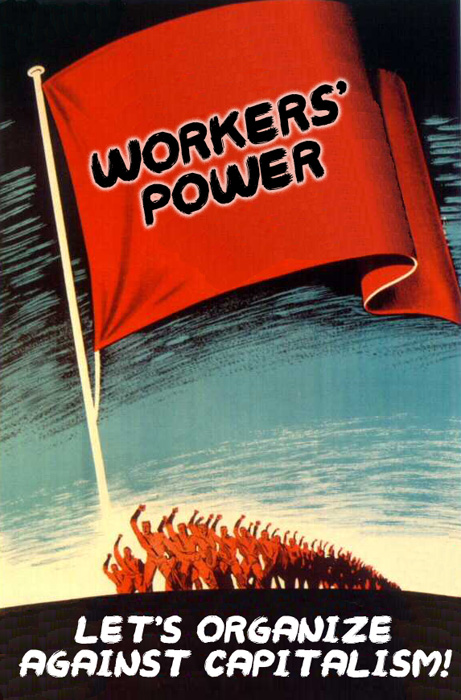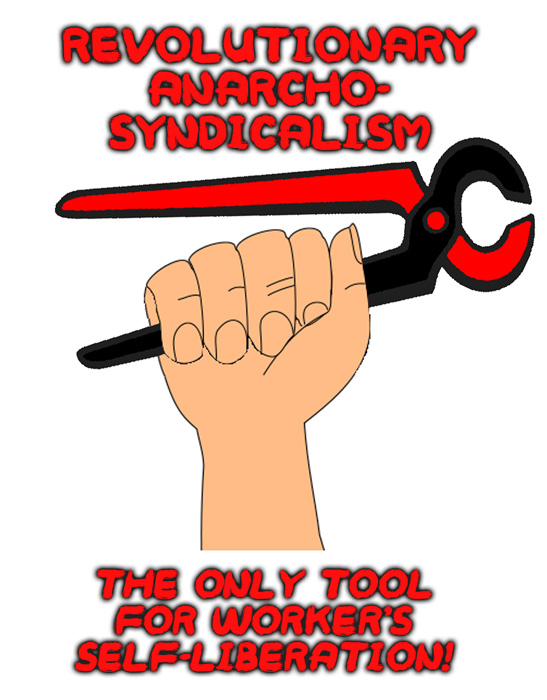|
|||||||||||||
|
Economy's Power Over State Politics
A Conversation Between Two Anarchists, By Punkerslut
Anarchist-Capitalist: The state is the greatest of all evils in society, as it has suppressed everyone from reaching their fullest potential. Anarchist-Collectivist: Everyone, except those who depended on the state, right? Everyone, except the bankers, the wealthy aristocrats, the investors, the pop stars and sports professionals, all of these people reached some of their "fullest potential." But, it seems quite clear that the state is not something separate from the people, and that it will try to make as many as possible dependent upon it. Anarchist-Capitalist: Sure, there are those who live off of it, but they are more Statists than they are Capitalists. Anarchist-Collectivist: What a curious description for people who held no state power, but possessed property. Do you deny that these people sought out the government on their own? Do you deny that these people agreed to submit to the authority of the state if it meant they could possess some domination over the others? Do you deny that they stepped on others, and partnered with the state's force in doing so? Anarchist-Capitalist: No, I cannot. Anarchist-Collectivist: What do you imagine the state to be? Anarchist-Capitalist: It is any force or entity that would think it could impose its power and will upon others, and may think it necessary to do so. Anarchist-Collectivist: Then what is the state, without the people it possesses, who are willing to impose upon others? Anarchist-Capitalist: It ceases to be anything at that point, but an idea. Anarchist-Collectivist: So, then, what is the difference opposition to Capitalism and opposition to Statism? How have you signed up for Capitalism, when there has never been a government corrupted except by Capitalists? They may have called themselves vassals, sheiks, and noblemen, but they are certainly all of the people who have depended upon the state for its violence. Anarchist-Capitalist: Yes, but they did not commit any violence themselves. Anarchist-Collectivist: Correct, they only hired others to do it. When it comes to the human being who is finally called on to use force, can you describe that individual for me? Anarchist-Capitalist: It's not the wealthy, but the poor, the many millions, the hungry, the thrown away, the abused, and the neglected who serve in the armies and the police. They possess nothing and have been bombarded by the propaganda of religion and state all their life. It serves both a material and a psychological need -- they have to eat and pray at the same table. This is who you'll find in the ranks of common soldiers. Anarchist-Collectivist: And what manner of life do you expect these people to hold? After all, they are defenders of the greatest evil of humanity, the state. In order to defend something so miserable and so murderous, there must either by large amounts of brainwashing and bribing, right? Anarchist-Capitalist: Brainwashing when it can, but bribing no. There are mercenaries and assassins that have been purchased throughout history, though never regularly. The common armies of any empire, though, have lived through dire extremes: starvation and disease, mutilation and death. A short life ending in great misery, or a long life scarred by painful memories. The soldier has received very little for their duties -- for building up the Soviet Union, the Third Reich, and the modern police states of the United States and Europe. Anarchist-Collectivist: But, you would call them the state, right? They are the ones who carry rifles, hoist bayonets, and drag cannons at the orders of their president, king, or tzar, right?
Anarchist-Capitalist: That is true. They are the people who are physically capable and willing to enforce their power and authority on others. This is why they are the state. Even though many Capitalists had no honor when they corrupted the government, they often had no choice since their competitors were doing the same. The solution is removing the state, who bleeds out its evil into relatively neutral institutions, like commerce, education, and culture. Anarchist-Collectivist: Does it not seem a little curious to you, then? We are in agreement that the laws, the police, the judges, the prison systems, and the legislators are among the greatest evils in society, correct? Anarchist-Capitalist: The greatest evil, of course. Anarchist-Collectivist: But you only place the blame on those who use force and violence. The state's power, in your opinion, is derived from those mobs of troops called the military. Yesterday, every one of them was naked and hungry, with a strong enough ideal to submit to less hunger in exchange for murdering human life. Yet, you give them the greatest responsibility in oppressing the people. Do you know realize that the guns, the ammunition, the food rations, and everything they need to become a military is provided by someone else? Anarchist-Capitalist: Yes, of course, it is provided by those occupying a higher level of the government. Anarchist-Collectivist: But where do you expect them to get it from? It's a curious question: what came first? The people who had nothing, but kill for the right to keep living? Or the material possessions they use to maintain their military advantage over others? In the first case, were a people to be dispossessed, and to discover tools at their feet, they wouldn't be in the position to be exploited as a disorganized mob of hungry and powerless. And in the second case, it would be quite unusual for anyone to simply abandon the equipment necessary to create a powerful army, right?
Anarchist-Capitalist: That seems logical so far. Anarchist-Collectivist: Since nobody would work to create the foodstuffs and weapons to sustain an army, to abandon it, doesn't it seem like they would sell it? Doesn't it seem likely they would make some type of investment with it that guarantees an economic profit? And, likewise, doesn't it seem that there would nobody willing to sleep in sand and live off of cold rice, without first possessing nothing? Anarchist-Capitalist: That is true. What are you implying? Anarchist-Collectivist: Well, we have defined a government as the physical, human basis of armed violence that maintains the power of the legislators, kings, and prime ministers. But first, there must be the poor and hungry, and second, there must be those who can profit by lending their tools of destruction to these masses. Correct? Anarchist-Capitalist: That, also, is true. Anarchist-Collectivist: Doesn't it seem like government could not exist, then, first without the Capitalists who exploited humanity into poverty, and second, without the other Capitalists who paid them to become a mercenary force called the state? Anarchist-Capitalist: Yes, that also tends to be the pattern of governments in the past. Anarchist-Collectivist: You are blaming the state's oppression, then, on those who are alone, isolated, without food or a means of getting food. And, in exchange for committing this awful, foul deed of defending tyranny, they receive a few mild crumbs and expose their young bodies to slaughter. But, it was the Capitalist who created this condition, by snatching up the land and excluding the rest of humanity from making a living. It was the Capitalist who created the conditions necessary to bind populations into obedient, disciplined soldiers. Anarchist-Capitalist: True. Anarchist-Collectivist: Finally, while the worker who gets subdued into military duty was hungry and poor, the Capitalist becomes wealthy and powerful from their investment. By being part of the state's armed aggression, the soldier becomes vilified by their own people, and their lives are exposed to dangers and misery. Those who joined the military had nothing but their own want, without hope or knowledge for something better. Those who created the military, though, by supplying it with arms, are of a very different character. They possessed advisors and consultants, mathematicians and statisticians, analysts of market trends and analysts of political trends. The Capitalist secures state power with as much precision and accuracy as though they were securing a market. How can you place so much blame on those who are ignorant and poor, without any power, when there are a handful of individuals who have clearly plotted and devised this plan of universal suffering? Anarchist-Capitalist: You cannot blame the Capitalist for the particular outcomes of government. They may very well be an unlikable person, but that does not make them responsible, simply because they are calculating and efficient. Anarchist-Collectivist: The Capitalist class devised the plan of government, created the conditions necessary for it, and when hungry millions finally submitted instead of starving, the Capitalists wrote the contract of government. You make enemies out of the poor and hungry who had no choice -- instead of the mighty and rich who had every choice. I am not arguing that the state is innocent, because I accuse it of the worst of crimes: enforcing a common slavery on all. But this doesn't stop me from realizing what the state really is: an investment of the wealthy, who expect to get returns on what they've put into the project. And, if they don't see them, they're follow the laws of economics: some other leader will be purchased, and the old one will mysteriously disappear, one way or another. What would you imagine to happen if the armies of the world were suddenly unsupplied with guns and food tomorrow morning? Anarchist-Capitalist: It wouldn't be long before they disbanded. Anarchist-Collectivist: And what would happen to the borders without a media, bought and paid, to give everyone the ideal of nationalism? And what would happen to the prisons without the bricks in their walls? And what would happen to the armies without their tanks and missiles? There would be no expectation that the members of the military could suddenly produce these things for themselves: they have no equipment for mining and smelting their own weapons, let alone the resources for food and water that might be required in the next few days. Once we are without the soldiers and the police of professional governments, the legislators and the kings would hold no real power. From the beginning to end, government is a Capitalist investment. There is no attacking government without attacking Capitalism, and no attacking Capitalism without attacking government.
Punkerslut,
|




